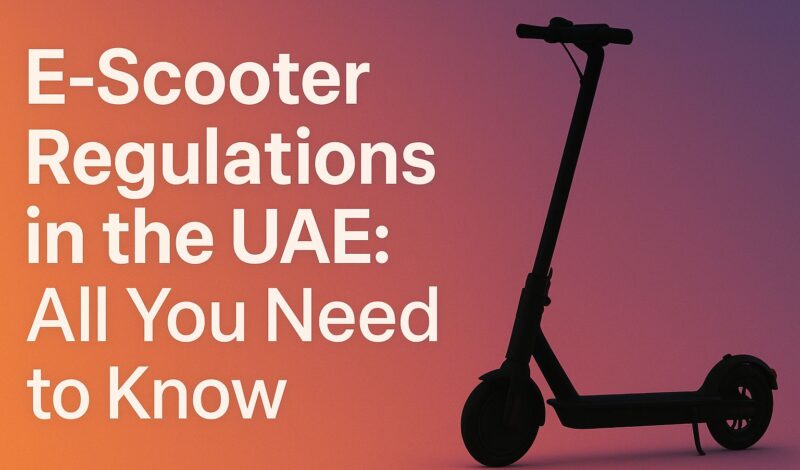Why Are E-Scooters Gaining Popularity in the UAE?
E-scooters have seen a rapid increase in the UAE’s urban landscape, offering a convenient and cost-effective alternative to traditional transport. Their popularity among commuters and delivery operators has grown in response, however, this rise in usage has also led to increased scrutiny from regulatory authorities, particularly the Roads and Transport Authority (RTA) and Dubai Police, who have introduced a framework to ensure public safety and legal accountability.
Who Is Legally Allowed to Ride an E-Scooter?
To operate an e-scooter legally in Dubai, riders must be at least 16 years old and possess either a valid UAE driving license or an RTA-issued e-scooter permit. The permit is free and can be obtained by completing an online awareness course that covers traffic rules, safety protocols, and zone restrictions.
Are E-Scooters Legally Considered Vehicles?
Yes. Under current UAE law, e-scooters fall under the bicycle category as per Federal Law No. 21 of 1995, which means riders are subject to the same obligations as cyclists. This includes obeying traffic signals, respecting signage, yielding to pedestrians, and avoiding highways, main roads, and non-designated areas. Despite the absence of a standalone federal law specific to e-scooters, this classification provides a legal basis for enforcement and penalties.
Where Can E-Scooters Be Used?
E-scooters are restricted to designated zones only. These include areas such as City Walk, Jumeirah Lakes Towers, Al Karama, Sheikh Mohammed bin Rashid Boulevard, Al Rigga, Al Mankhool, and Al Barsha. Speed limits are capped at 20 km/h, with certain zones enforcing a lower limit of 15 km/h. Riding in pedestrian-only zones, on highways, or in unauthorized areas is strictly prohibited. Violations can lead to immediate penalties and seizure of the vehicle.
What Safety Gear Is Required?
Safety compliance is mandatory. Helmet use is required at all times, and riders are encouraged to wear reflective gear and appropriate footwear. Failure to comply may result in fines ranging from AED 200 to AED 500, and in some cases, the scooter may be confiscated.
What Are the Risks of Non-Compliance?
Recent accident statistics have prompted further regulatory action. In 2024, Dubai recorded 254 accidents involving e-scooters and bicycles, resulting in 10 fatalities and 259 injuries, including 17 serious cases. The first half of 2025 saw 13 deaths linked to unsafe road behavior, with four directly involving e-scooters. These figures highlight the importance of compliance and the risks associated with improper use.
Can E-Scooters Be Taken on Public Transport?
As of 2025, foldable e-scooters are permitted on Dubai Metro and Tram systems, provided they are carried and stored in designated areas. However, they remain prohibited on public buses due to space and safety concerns. Riders are not allowed to operate e-scooters on the premises of public transport stations. These rules mirror those applicable to bicycles under UAE transport law.
How Can Riders Stay Legally Protected?
At Ayesha Al Dhaheri Advocates and Legal Consultants, we closely monitor even the smallest regulatory developments to ensure our clients remain compliant and protected with public safety and legal responsibility always at the forefront. Whether you are an individual or business operator, or service provider in the micromobility sector, our team is here to assist you with complete legal clarity and confidence. For any legal guidance or support, do not hesitate to contact us today.

